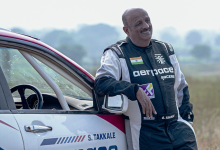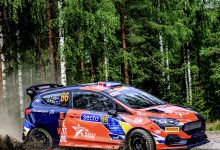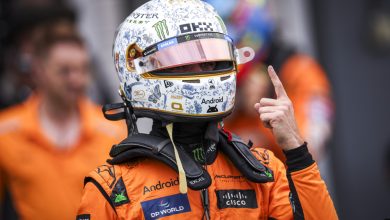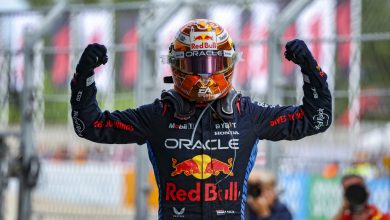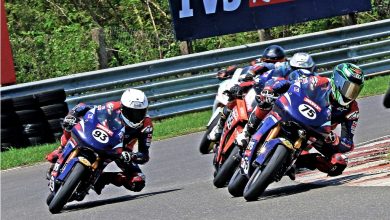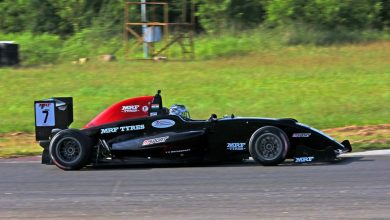Concorde Agreement is more of a partnership: Christian Horner
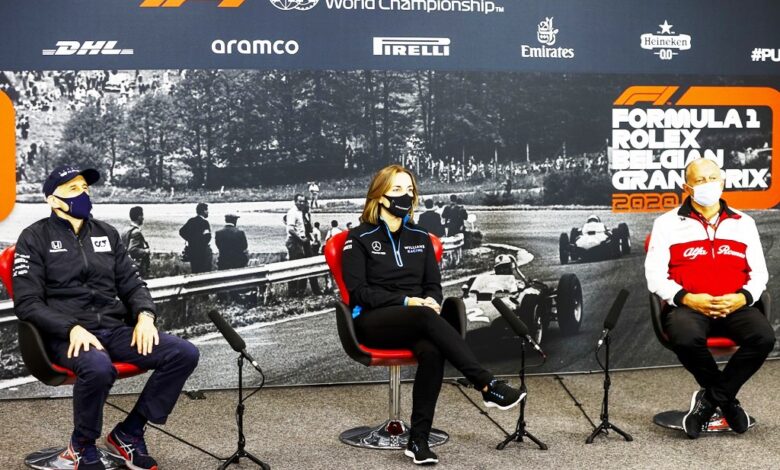
The following team representatives – Guenther STEINER (Haas), Christian HORNER (Red Bull), Toyoharu TANABE (Honda) were present at the first press conference. The second conference transcript follows later:
PRESS CONFERENCE
Q: Guenther, first of all, a quick résumé of FP1 and the problems that both of your drivers had, please.
Guenther STEINER: The résumé is very quick because we didn’t do a lap. We had both engine issues, non-related one between the two of them and we have to change engines now for FP2 and hopefully we can get it done in time.
Q: Let’s talk about some positive news. Haas has signed the Concorde Agreement last week. In the weeks and months leading up to that, how concerned were you about the future and what were your conversations with Gene Haas throughout all that?
Guenther STEINER: I personally was not concerned. I worked hard to present a case which works for Mr Haas, you know? Because it still makes sense to use Formula 1 as a global marketing tool for his company. We just needed to reduce costs and get more efficient and that’s what I did in the time we had off in the pandemic at home, working hard on plans, how to help finance the teams and how to do the next five years. And then, I presented that to him, and it took him a few weeks to think about it and he decided he wants to continue because it still works for his company.
Q: …and of course the deal means that you can now start planning things like driver line-ups. Have those conversations started, and can you give us the strengths of Romain and Kevin please?
GS: No, the conversations haven’t started yet because I always said I wanted to first to get the Concorde deal done – or we want to get the Concorde deal done, and then we think about it. Gene hopefully comes to some of the next races and then I can sit down with him and discuss our drivers, or what he will do for the future, which direction we go. I think their strengths are they are both experienced drivers now. They are both with us a long time, Romain even a year longer that Kevin and in the end they did a good job for us – but sometimes you need change. But we don’t know. I’m not saying here that we change them: I just don’t know what we’re going to do. I’m not thinking a lot about that one right now. That will come as well to sit down with Gene and have discussions with him and then for sure he will have his ideas and we’ll put everything together and come up with a solution for it.
Q: Christian, coming to you, on the subject of the Concorde Agreement, you signed it first in Barcelona. What was it about the agreement that prompted you to commit so quickly?
Christian HORNER: Well, I think we’ve been talking about this agreement for almost two years now so you have to take a holistic view on these things. I think we’d reached a point where the agreement was what it was and you’ve got to take a view on it. Liberty have been very clear since the beginning. It’s been a lot less fun negotiating with Chase than with Bernie but he’s been scrupulously fair and so I think there is a different distribution now, with things like the cost cap and a more even spread of distribution. Teams like Haas will certainly benefit from that. From a Red Bull perspective, obviously, seeing how Liberty have been running the sport the last few years, it feels like commercially they’re going in the right direction and this agreement feels less binding than other agreements that we’ve signed in the past but it’s more of a partnership I would say. It’s now down to the teams to work collectively with the promoter to improve the show and the appeal of Formula 1. And this is an opportunity by all the participants signing to that to work collectively on that.
Q: Now, looking at this season, we’ve just had the 17-race calendar confirmed. Given that you’re behind in the points, Max 37 points behind Lewis Hamilton, how significant is it that extra races have been added? How beneficial to you?
CH: Well, hopefully it helps! Obviously there’s still a long way to go. Usually after what would have been the summer break we’d have had nine or so races left, now we’ve got 11. It’s just great to be racing and obviously every measure and precaution is taken to keep Formula 1 active and going to some interesting new circuits. Circuits that we haven’t been to for many years. The last time I was in Mugello I was racing there in 1997. I just hope we do a little better than I did then. To go back to Imola, Nürburgring, Istanbul, again another great circuit, so there’s some good challenges coming up. I think the races come thick and fast. Hopefully we can put more performance on the car and it’ll be nice to have more days like we had at Silverstone a few weeks ago.
Q: Tanabe-san, starting with the Concorde Agreement, both Red Bull Racing and AlphaTauri have committed to Formula 1 for the next five years. Are Honda going to do the same?
Toyoharu TANABE: As a PU manufacturer, we are not involved in this. I think it’s a good thing all teams signed to the agreement for the next five years. Regarding your question, I’m taking care of the trackside technical things. I’m not involved in the discussion for the Honda future – but I know that talks are ongoing.
Q: Looking to next weekend’s Italian Grand Prix at Monza, there are going to be restrictions on the power unit modes that can be used. What will be the effect of that on how Honda operates over a race weekend?
TT: It happened very fast and actually we are working on how to operate our PU in the qualifying and the race – I mean with the same mode. We need to consider the performance and the reliability, balancing and then, as you said, we have 17 races now confirmed. We need to make a picture to the end of this season, so how to use the PU and how to compete in each race.
VIDEO CONFERENCE
Q: (Dieter Rencken – Racing Lines) Question for Christian and Guenther please. Christian, you referenced the fact that there was less of a commitment in this particular Concorde. There are constant comments about it being a five-year commitment, is it not more a case of it being a one year commitment for a five-year period? In other words an annual decision that can be taken before the end of March each year? And the other question is, did this particular element make it any easier to sign the Concorde Agreement?
CH: Obviously Dieter, as you well know, the agreement is strictly confidential between the teams and the commercial rights holder, so I’m not going to divulge any of the information within that agreement. But I think that previously parent company guarantees have had to be provided which hasn’t been the case in this agreement, so it obviously makes it a lot more tenable in certain areas. It’s, as I say, important to see the agreement as a collaboration that we all work for the benefit of Formula 1 to make sure that the product improves, that the racing improves and as a result the stakeholders, the fans, get a better product out of it.
GS: The only thing to add to what Christian just said there – which is completely correct – it’s also that you have to see it as… the teams are pretty big, even with the budget cap, the teams will be still big and you cannot plan just months ahead because then you will never be successful. The practical issue of it is that, even if there is a theoretical out, you can do it but you cannot plan for it. Because if you plan for that one, you will not be successful and you will just be wasting your time and money by going year-by-year. So, I think it’s as good as it gets and I think most of the teams see it as a five-year agreement, not with the intention to stop it any earlier.
Q: (Christian Nimmervoll – motorsport.com) Question to Christian. You’ve had Sebastian Vettel in your team between 2010 and 2013 when he was winning all those championships with blown diffuser cars, pre-hybrid. Do you think part of his struggle at the moment is the formula has changed, and that was a particular formula, those blown diffuser cars, that suited him?
CH: Not really. I mean, Sebastian drove with refuelling, no refuelling, blown diffusers, no diffusers, F-Ducts, no F-Ducts, DRS, no DRS so, he drove a whole variance of different cars over the years and obviously what he achieved in the period during those years with Red Bull was quite special. I think he’s the third most successful driver in the history of the sport and he’s achieved some incredible things – many records which will stand for some time. For whatever reason, things aren’t working for him at the moment. I think any driver has to be happy in their environment and you can see that he’s carrying quite a lot of weight on his shoulders and that has a bearing on any sportsman, on any athlete. I don’t think we’re seeing the real Sebastian Vettel at the moment. He’s obviously having a difficult time with the product that he has at the moment – but yeah, you can’t take away anything that he’s achieved, obviously, in his career to date.
Q: (Andrew Benson – BBC) Christian, you had high hopes of challenging Mercedes this year. What’s gone wrong? Why is the car not performing as well as you’d hoped? And how concerning is it this repeated pattern of starting seasons slowly?
CH: I think Mercedes have done a great job over the closed season. They’ve come out with a very competitive car. We’re still splitting the Mercedes at the moment which is a phenomenal achievement by Max and yeah, we are working very hard to close that down – but they are a big machine, a well-oiled machine, a well-funded machine and obviously, as a package they’re doing a very, very good job at the moment, so we’re working very hard, we’ve had a good run of results and obviously we want to close that gap down because it’s not just this year, it’s also next year that it applies to. I think hopefully we have stuff in the pipeline, hopefully a better understanding of some of our issues from earlier in the year which will see a stronger vein of development could through onto the car.
Q: (Luke Smith – Autosport) Question to all three. We’ve had the announcement about 20 minutes ago that Bahrain, for the second race, will be using the outer, oval-style layout for that circuit. Can I just get your reaction to that – and how impressed have you been with how creative F1 has managed to get with this year’s calendar, given all the challenges that have been put in place?
GS: I haven’t looked at any detail of the new circuit layout in Bahrain – but I think it’s a very nice thing if you’re staying two times in the same place to have a different circuit layout, if it is two in Bahrain, is doable. I think that will be good – also for the spectators on TV, to see how it works. The more important thing is how Liberty dealt with this, to find locations and to dig deep to find the places to go, which are new, which makes it interesting for the rest of the season. For this season, it’s fantastic. For sure, there’s a lot of work involved in very short periods of time and financially it all needs to work as well. I think it was a difficult task but they dealt with it very good. It’s like as Christian said before, going to race tracks you haven’t been to for a long time, it’s actually very nice. It’s something new, something to think about, something different – so for the spectators and for us I think it’s just a very good achievement from them.
CH: We’re always so welcome in Bahrain and they’ve got a great facility there so the fact that we’re using an oval is really interesting. It’s a big different for Formula 1. Honda – Tanabe-san – has a great deal more experience of oval racing having just won the Indianapolis 500 last weekend. We’ll be looking to benefit and draw on all of their experience and knowledge and, I have to say, congratulations to Honda on that 1-2-3 finish in Indianapolis last weekend. I don’t think it’s going to be an Indianapolis-type circuit but I think the challenge of an oval type layout, that part of the circuit is going to be different. It’s going to be a short lap and should be exciting. So yeah, we’re looking forward to it.
TT: I think it’s good to have a different type of track at the same place. Christian gave me a big pressure to improve our performance in the new layout – so it’s a challenge. We work on the simulation and improve our PU management to achieve the maximum performance at the circuit.
Q: (Erik van Haren – De Telegraaf) Christian, there are lots of stories and opinions about Alex Albon and the way he struggles besides Max Verstappen. You defend him and try to give him confidence. Is there a different approach from you guys towards Alex, compared to Pierre Gasly last year?
CH: Well everybody’s obviously got an opinion on this topic but they don’t have really the facts. So I think that Alex is doing a good job in what’s been a difficult car this year. It’s a different car to last year, I’d say the car’s harder to drive than 12 months ago. When he got in the car 12 months ago he did a much stronger job than Pierre had done up to that point in the year. I think Alex has got a lot of talent that obviously we haven’t seen come to the surface yet. His racing has been very strong on a Sunday but he’s struggled with the car over a single lap. And, of course, Max has been so strong at getting the most out of the car. You think back to some of the great drivers, whether it’s a Schumacher or a Senna, and being a driver alongside those guys was very tough. I think that’s a similar situation that the seat alongside Max has at the moment. Alex is only going to get better: he’s still pretty young and inexperienced. This is only his second season of F1 racing and we’re doing all that we can to support him and develop him. And as we’ve seen, this is a driver that nearly won the first race of the year. Strategically we were sharp. He obviously got turned-around by Lewis that race. He was fighting for the podium and should have been on the podium in Brazil at the end of last year. I think he’ll have more Sundays like that in the coming races where he’s competing and fighting for podium finishes on merit. So, the team has confidence in him and belief in him and we’re happy with our choice.
Q: (Dieter Rencken – Racing Lines) For Christian and Guenther. One of the criticisms of the previous commercial agreement was that the fact that it didn’t treat all of the teams equally. Could you two gentlemen please confirm that the current Concorde Agreement, in other words the ’21 to ’25 Concorde does treat everybody equally, with the exception of Ferrari who get their 5% and of course the protection right, or veto, as it is called. Does everybody else get treated exactly the same?
GS: I think it is a difficult answer, because the prize money is divided by your position you finish, so if I say it’s equal it isn’t right to say that. The rest of it is like everything has got a value and I think it is as equal as it can be for the show we are putting on. For sure, the smaller teams will be never happy until they get more and it gets ‘inequal’ in their favour. As far as going into details, I don’t want to here, of the commercial agreement, it’s between the parties, but I think it was made a big step from the last one to this one. To make 10 people completely happy, which are structured different between the 10 of us, is almost impossible, so I think it was a good step made in that direction and I guess everybody was happy, because everybody signed it. Because if somebody wasn’t happy, they wouldn’t have signed it, Dieter.
CH: I think it’s a fair agreement. I think as Guenther has pointed out if people didn’t like it, they wouldn’t have signed it. I think that everybody is treated equally. I’m sure in your world Dieter all journalists should be the same as well. So, the details of the content of the agreement is going to remain confidential between the parties and that’s the way it will remain.
GS: I’m sure Dieter, if he has the choice, he would like to be treated better than the other ones. It’s what I said before: you will never have everybody happy, so I think it is quite a good agreement for us. And Dieter will get more than all the other journalists anyway.
Q: (Edd Straw – The Race) A question for Tanabe-san, please. On the Bahrain Outer Circuit, how big a challenge is that track going to be for the engines, in terms of lots of full throttle, quite demanding and also establishing a good ERS recovery strategy for the whole lap? Is it going to be particularly difficult?
TT: I haven’t looked at the layout at all. Once we receive the detail, we will analyse and consider how to use the PU, in terms of an engine reliability point of view because of the high load, wide open and also the energy management. We will see.
Q: (Julien Billiotte – Auto Hebdo) A question fro Christian. You kept a fairly low profile on the Racing Point saga. What does Red Bull make of Renault’s decision to withdraw their appeals and are you as confident as they seem to be that the 2021 regulations will prevent a repeat of the RP20?
CH: I’m sure that Renault must have confidence that will be dealt with in the forthcoming presentation of regulations for 2021 onwards. Otherwise I can’t believe that they would have withdrawn that appeal. I haven’t had any discussions with Renault to understand their rationale behind withdrawing, but one can only assume that they must have that confidence that this issue is going to be fully addressed. From a Red Bull perspective, it’s just important for us, because we just want to know what is allowed and what isn’t, because Red Bull uniquely own 100% of two teams. There’s not another two teams in that situation. So of course if the Racing Point model is allowed, we will go that route and turn up with four identical looking cars next year. But I believe that in what has been agreed and in what is presented and which will be voted on has addressed that.
Q: (Andrew Benson – BBC, via email) You’ve changed frontal aero philosophy this year, adopting a cape rather than J-vanes. Is this partly the cause of the problems with the car’s unpredictable behaviour and do you and Adrian Newey believe that the high-rake philosophy has been proven now to be the wrong route given Mercedes’ success?
CH: Not really, because I think Mercedes have been raising and raising their rear ride height. If you look at how much it has increased over the last few years, it’s not a long way off where we are. So I would disagree with that comment. These cars are incredibly complicated aerodynamically now. You have only got to look at the components that make up a barge board, a front wing, the underside of a front wing and inevitably sometimes you can get things that don’t work in perfect harmony or in different conditions. I think we have got a decent understanding of what hasn’t been behaving on the car and have some hopefully good, positive steps in the pipeline. Our priority at the moment is to try to get the most out of this weekend and see what it brings. It looks like there could be some interesting weather on Sunday and that could also introduce another factor.
Q: (Joe Saward – Autoweek) I’ve got a question for Guenther on the Ferrari engine performance. Does it make sense for the team to talk to Renault, who don’t have any partners in the future and might be looking for one?
GS: It would be very difficult for us, how we are set up in the moment, to make a quick change. It would need to be made over a few seasons. It cannot be made, for example, for next year or something like this. At the moment we go through the tough times with Ferrari and hopefully we can both get out at the end in a better state and that is what we are doing at the moment.
Q: Tanabe-san a question for you. Looking at the list of power unit components used so far this season, Honda appears to have used the most. Do you have reliability concerns for the remainder of this year?
TT: No. We are working on our PU usage plan, according to the current allowed number of PUs. It looks like more than the other PU manufacturers but we have no plan to take a penalty because of the new unit introduction. So far we are on schedule.
Q: (Dieter Rencken – Racing Lines) Guenther, you previously said that until there was clarity about the number of races for this season and also for the future of the team there wouldn’t be any upgrades in the pipeline. Now that we know how many races there are going to be – there are going to be 17 – now that you have signed the Concorde for next year, where next year’s car is basically based on this year’s car, will you now be embarking on an upgrade programme this year?
GS: Not for this year, Dieter. We are not planning any upgrades this year. For sure, next year we need to do some stuff because the aero regulations changed to reduce the loads for the rear tyres. We are working on that but for this year we haven’t planned anything. We would run out of time anyway. If you had started now to designs something, wind tunnel test it and then produce it, it would make very little sense to make, because it would maybe two or three races. We decided not to do any upgrades this year and just focus on next year and then on the new regulation in 2022, which is our biggest opportunity in the mid-term.
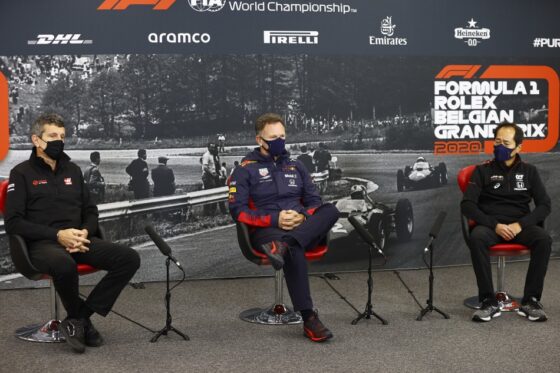
Part II – Second Press conference
TEAM REPRESENTATIVES – Franz TOST (AlphaTauri), Claire WILLIAMS (Williams), Frédéric VASSEUR (Alfa Romeo)
Q: Claire, following the sale of the team to Dorilton Capital, what can you tell us about the new owners and the structure of the team going forward?
Claire WILLIAMS: First of all, I think it’s important to say that we are delighted that we have managed to secure this outcome of the strategic review process. In this kind of financial environment, it’s never easy to undertake these transactions but we are very happy at Williams that we have managed to secure new owners, but also owners that we know are hugely passionate about this sport and also about Williams. They have very clear ambitions for where they want to see this team and they are prepared to put that investment into the team in order to do that. For the moment, it’s business as usual, nothing changes in the here and now, and we’re looking forward to going racing this weekend.
Q: And Claire, knowing how passionate you are about your team, how difficult has it been for you to sell these shares?
CW: I won’t be lying if I said it hasn’t been emotional over the past few months, but it has been a few months so we have all managed to get our heads around it and this can only be a good things for Williams. We have always in our family put this team first. It’s always been at the heart of the Williams family. We’ve put our people first and we’ve put the success and the future of our team first in making any kind of decisions in what we do. So this was almost, I suppose, a no-brainer for us. The team needed the investment and the team now has a really bright future under its new owners. I think most importantly for the fans out there, you will still see the Williams name racing in Formula 1.
Q: Thank you Claire. Fréd, coming to you next. A frustrating morning for Antonio Giovinazzi. What can you tell us about his issues?
Frédéric VASSEUR: Ah, he had a water leak on the engine side. It’s a shame because he was not able to do a single lap today. Let’s see what happens with the weather also, because it’s a big shame if he is not able to do some laps with slicks before the quali. But it is what it is.
Q: Can I ask you about the new Concorde Agreement. How pleased are you with the new deal and what kind of opportunities does it present for a team like Alfa Romeo?
FV: I think it’s not just for Alfa Romeo or for another team. It’s good for Formula 1, it’s a good step forward for the championship. The sustainability of the small teams it’s probably also an important topic for the big teams. They have to avoid just being focused on themselves. At the end of the day we have to have a complete grid of 20 cars and we have to be sustainable. I think it is a good step forward in the right direction. I think that everybody would like to get a bit more here or there, but at the end of the day it’s a good compromise.
Q: We had Kimi in the press conference yesterday and he spoke about his future, saying that he has yet to decide whether he wants to continue in Formula 1. If he wants to continue, will you have him?
FV: I think the most important thing is the motivation, the motivation on the driver’s side first, because I think it’s difficult for Kimi to struggle with the pace when we are at the back. Now that we did a good weekend last weekend in Barcelona, the pace was much better. This morning was also much better and we have to continue to improve and to do small step by small step and to be back into the fight. This is the most important thing but not just for Kimi, but everybody in the team. The main motivation in a racing team is coming from the results and nothing else, from the drivers to the mechanics, to the engineers, to myself and we need to get results.
Q: Are you impressed with the job Kimi has done for you this year?
FV: Yeah, yeah! Honestly, Kimi is far from being the biggest issue! He’s doing a good job. We saw last week in Barcelona that the pace is there, this morning again – he is in front of the two Ferraris. It is a good reference for us. Let’s see what happens tomorrow and Sunday and we have to continue to push and to get the last tenth on every single topic and I think that Kimi is pleased when we have this kind of motivation.
Q: Franz, let’s start with the Concorde Agreement if we could. It’s the final part of the puzzle that’s hoped to level the playing field in Formula 1. Are you confident that it’s going to do that?
Franz TOST: Yes. I must say that we are really satisfied that the Concorde Agreement is signed now. Good job done by the teams and also the FOM and the FIA, because it was not so easy. It was long negotiations. We from the midfield teams, especially AlphaTauri, now are really happy that this Concorde Agreement is signed because the money distribution is much better nowadays than it was in the past and I think in combination with the cost cap and the much fairer money distribution the field will come much closer together, which should guarantee interesting races.
Q: Thanks. Now a question about Yuki Tsunoda. Have you been impressed by what he is doing in Formula 2 this year and are we likely to see him in an AlphaTauri any time soon?
FT: I’m not only impressed with his driving in Formula 2, I was impressed with him last year in Formula 3 as well and the years before. He is a high-skilled driver and he has all the ingredients together to become a successful Formula 1 driver. For sure, he will test for us in Abu Dhabi at the young driver test. Whether he will drive for us next year or not, this is being decided by Red Bull and it depends also whether he gets a Superlicence. If he continues like now then he will be within the first three or four drivers in the Formula 2 championship and it shouldn’t be a problem to receive the Superlicence and the rest then we will see.
Q: (Christian Nimmervoll – Motorsport.com) Claire, Dorilton Capital made the transaction through an investment vehicle that is called BCE Ltd, that is coincidentally the initials of Bernard Charles Ecclestone. Can you just clarify if there is any connection or any link in this deal with Bernie, if he’s involved in it in any way? And also, can you comment on if you’re going to be team principal beyond this season?
CW: Yeah, I saw this. I spoke to Mr Ecclestone earlier in the week and I did ask him if it was him behind it. That a joke, by the way. Bernie has nothing to do with our new ownership. Dorilton Capital is completely independent. Bernie is not the new owner of Williams and, as I said earlier to Tom, I am in my role, I’m here, I’m doing my job, I’m actually deputy team principal, not team principal. My father is team principal still and it is business as usual.
Q: (Luke Smith – Autosport) Another question to Claire: I think it has been quite a momentous couple of weeks for Williams in terms of everything that’s happened with the sale, with the Concorde Agreement, and also the clarification regarding car copying, which you said was the reason for withdrawing the appeal. How much brighter do things look for the team now, moving forward? How much more confident and excited are you about the team’s future, even compared to, say, a month ago?
CW: Yeah, that was… the whole purpose behind this strategic review process was in order to secure this team’s future. It has been an incredibly difficult few years for us for a number of reasons, both on track and off track. I think we have done an extraordinary job keeping the team going in what has been a very difficult financial environment for it and this is the dawn of a new era for our team. We have secured the investment that was the whole purpose of this strategic review process. We have great new owners who are willing to put the money in that’s required in order to take this team forward and so couple that with the new Concorde Agreement that kicks off in 2021 I think Williams can really start to start moving further forward up the grid and making some good progress and that’s all we want to see.
Q: (Adam Cooper – Motorsport.com) Claire, in the sale announcement you said that Dorilton are ‘people who understand the sport and what it takes to be successful. Can you expand please, on what sort of knowledge they have of Formula 1?
CW: As I said, the Williams family have always put this team first and we wanted to make sure that we would be able to find new owners for it that did understand this sport. I can’t go into a whole lot of detail as to the people behind Dorilton. That will become clearer over the… we will be able to make that clearer over the coming weeks and months but they’ve done a huge amount of due diligence since the start of this process. They were in the process from the beginning, they have spent an awful lot of time behind the scenes going through everything that you would expect them to go through to understand our team but also to understand the sport. They have some very strong advisors as well, who have been helping them through this process to build their knowledge and of course there’s still going to be a learning process for them but they are already within the team, they’re working on Grove with our team there currently in order to understand what’s required moving forward. So I have absolute confidence that they are the right people to take this team forward.
Q: (Dieter Rencken – Racing Lines) Franz, I wonder if you could clarify whether AlphaTauri, Toro Rosso or Red Bull have recently sold any of your older cars and if so, how many and why?
FT: (Chuckles) We have sold one, two, three or four older cars. One or two are being raced, as far as I know, from some gentlemen drivers. We just sold them because we have many of them; every year we build around four cars and the philosophy from AlphaTauri is that we keep one car and the other three cars, if there are customers, if there are people interested in buying them, they can have them. If you want to have a car, please come with the money and you will get them, no problem!
FV: The same for me.
Q: (Ben Hunt – The Sun) Sorry, just another question for Claire: I just wondered what’s stopping you from explaining more about… you said it will all become clear but what is the reason why we’re not finding out more about them now? Secondly, I just wanted to know, with reference to a question which was put to you earlier on. Remaining as deputy team principal or even Frank remaining in control, was that part of any of the negotiating when the sale went through?
CW: I think, Ben, your question about Dorilton… I’m not sure what more we can reveal about them. They are a US-based investment firm. Their chairman is a gentleman called Matthew Savage. Their CEO is another gentlemen called Darren Fultz. They own a number of different businesses. They’ve been in operation since 2009. They have 60 businesses under management; within that portfolio there’s a broad spectrum of industries across which they work and obviously they haven’t been in motor sports before and they are very excited about this opportunity. I’m not sure that there’s much more that we can explain about who Dorilton actually are and I’m sure you’re going to be seeing them at a race track soon. And I think the second question as about my role, Frank’s role. This is very early days, obviously, and for the moment though, it is business as usual. I’m here in my capacity that… I was running the team in Barcelona and the races prior to that and that will continue to be the case.
Q: (Andrew Benson – BBC) Can I ask about the future of Mike O’Driscoll as well?
CW: Exactly the same: it is business as usual.
Q: (Joe Saward – Autoweek) Claire, along the same subject, I’m afraid. On their website, Dorilton say that they are a family office, in effect they are spending the money for a family, so the people you’ve mentioned are just managers of the fund, not the actual money. Can you confirm that’s the case?
CW: I can confirm that’s the case, yes Joe.
Q: (Abhishek Takle – Mid-Day) Claire, could you talk a little bit about how contact with Dorilton was initiated, once you started the process and were there ever any other parties, be they investors or potential buyers, involved?
CW: As I think I talked about, over the duration of this process, which started back in April/May time, we had a number – a considerable number of interested parties in the team who we talked with throughout the process, over the past few months. We were very happy with the level of interest that we received and I think that is also a great barometer for the health of our sport, as well, that there is interest in our teams and our sport as a whole. I think that clearly the new regulations are helping that. Dorilton approached us, initially, and I think in fact all of the bidders that we were talking to made the approach to us, versus us going out to the market, making those approaches.
Q: Franz, this race marks the anniversary of Pierre Gasly’s return to the team. How has he developed over the last 12 months?
FT: No, I must say it’s exactly one year ago when Pierre came back to us. I remember when he came the first time to the factory, I said to him, hey, it looks like you were here yesterday, because we were so familiar together and he knew his engineer quite well, his mechanics, he felt familiar from the very beginning onwards. And fortunately our car last year was also quite competitive and therefore he immediately got some results, some good results and of course the highlight was the second place in Sao Paulo and he made really good progress during the last year, but also this year you can see that he gets more and more self-confident and I am also convinced that he will show very good races the rest of the season.
Q: (Adam Cooper – Motorsport.com) To all of you: Formula 1 has confirmed that the second Bahrain race will run on the outer circuit with qualifying times of less than 55 seconds. What are your thoughts on that and have your guys looked at it in detail or done any simulations yet?
FV: Yeah, we didn’t do any simulations yet but for sure with 55 seconds per lap it will be a big mess on that traffic on the qualifying laps and it will be nightmare but I think it’s exciting to have different layouts of the tracks when we have a double event like this, that it makes sense to do something a bit different and the advantage with Bahrain is that you have at least three configurations for the layout of the track. It makes sense, it will be a bit different to the first one. Let’s see.
CW: Yeah, I share Fred’s views. Firstly, I think that Formula 1 have done a fantastic job to try and get so many races on the calendar and to allow the teams or to facilitate the teams to be able to race in the same location twice obviously helps with a load of logistic issues that we’re facing at the moment with all these triple headers. But from what I hear, this new track layout is going to be incredibly fast which is going to make it interesting but clearly it has only just been announced, we haven’t started doing any simulation work but I’m sure everybody is going to be jumping on that as quickly as possible.
FT: There’s not much to add. You know we haven’t yet started the simulation work but it will become… especially in the qualifying, from the traffic, maybe a little bit chaotic but entertaining, we will see, and in the race then we will see how it is with overtaking because all the cars are very close together and then we will see how good the top cars and are how many times they will overlap everyone.
Q: (Christian Nimmervoll – Motorsport.com) Claire, now that the transaction is completed, we basically know that Dorilton Capital is a shareholder in Williams, we know about some shares that are at Frankfurt stock exchange in pre-float; are there any other shareholders remaining? What about, for example, Brad Hollinger, Toto Wolff? And following up on Joe’s earlier question, who is the family behind Dorilton Capital?
CW: No, so Dorilton Capital has bought the full shareholding of Williams, so they are 100% owners and I have no comment to make on your second question I’m afraid, Christian.
Q: (Edd Straw – The Race) Claire, obviously with the new Concorde having been signed which is a good direction forward for F1, is it a little bit frustrating almost…because obviously the situation has seen the family having to sell it is partly connected to the terms of the last round of commercial agreements, seven years ago, so is it a little bit frustrating that you couldn’t take is a little bit further under family ownership because of that difficult period under those commercial terms, because obviously it could be quite a good sustainable going concern under the cost cap and the new Concorde etc?
CW: Yeah, I think… and I read your article that wrote about Williams’ decline over the past 10 years, it may have dated back earlier and I think you probably hit the nail on the head. I don’t think the new Concorde Agreement helped our team and I’m sure it didn’t help a number of other teams either, just purely based on the financial disparity I suppose, between the prize fund distribution and clearly we’ve been able to work with Formula 1 in order to restore greater balance, I think. Whether it’s frustrating, it is what it is, I think. I personally am really pleased that the Concorde Agreement and most importantly the financial regulations that are coming through with the cost cap and the redistribution of that prize fund money, are going to make it a lot fairer playing field for teams like ours and whether the Williams family own it or not, that doesn’t matter. This new Concorde Agreement certainly puts our team in a much better place moving forward and that’s the only thing that matters.
Q: (Dieter Rencken – Racing Lines) To all three: how much did the fact that there’s an annual flexibility in the Concorde Agreement make it easier for yourselves or your team owners to sign up to the Concorde?
FV: Yeah, but as we said before, this kind of agreement, with ten teams around the table, the FIA and FOM, it’s never easy to sign. I think everybody did compromise and finally I think we found a deal with a good step forward for everybody and OK, we always want to get more and every single team would like to get a different position but at the end I think it’s a very good step forward for us and when I say us, it’s everybody around the table and it is like it is.
CW: I didn’t actually understand Dieter’s question. I echo what Fred said.
Q: (Dieter Rencken – Racing Lines): Claire, basically the question was… there’s this annual flexibility built in there so it’s not really a five-year commitment. How much easier did it make to sign the Concorde Agreement under those circumstances?
CW: Yeah, I think the most important thing is that the Concorde Agreement is signed and the terms within that across the various different elements are what we wanted to see so I’m very comfortable with that.
FT: I must say that all the negotiations for this new Concorde Agreement were much more transparent than in the years before. I must also say that the top teams, at the end, agreed to lose some money because it’s not so easy for them. We must not forget that they have built up a fantastic infrastructure the last years and they will also lose some people and I think in the sense that for the future of Formula One all the teams were sitting together, negotiating together which was not always the case in the past and therefore I think we now have a really good basis for the future of Formula 1.
Q: (Abhishek Takle – Mid-Day) Claire, but I just had a clarification on your business as usual comment. Obviously it’s business as usual in terms of the management structure of the team but will it be business as usual for the foreseeable future? Is that how you see it as well?
CW: Look, you’re asking the same question that everyone else keeps asking me and my answer remains: it is business as usual for the time being and that’s all I can really say.
Q: (Mario Luini – Revue Automobil) Fred, do you know have a better idea of the problems with the C39 and how soon can you correct them?
FV: I’m not sure that we have a big problem with the car. If you have a look, I’m sure we have a lack of performance compared to last year but it’s never coming from one single thing, it’s coming from different areas and step by step we are improving, we are trying to sort it out and we are doing good steps. If you have a look, last week we were P13, we are one position in front compared to the year before in Barcelona and this morning we were also in good shape. We have to stop fantasising about things like this. The most important is to stay focused and to try to catch up tenth after tenth in every single area with the performance and I think the team is dedicated too.

